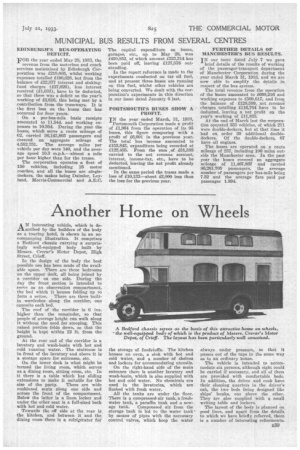MUNICIPAL BUS RESULTS FROM SEVERAL CENTRES
Page 53

If you've noticed an error in this article please click here to report it so we can fix it.
EDINBURGH'S BUS-OPERATING DEFICIT.
FOR the year ended May 28, 1933, the
revenue from the motorbus and coach services maintained by Edinburgh Corporation was £219,005, whilst working expenses totalled £196,628, but from the balance of 122,377 interest and sinkingfund charges (£27,026), less interest received (£1,033), have to be deducted, se that there was a deficit on the year's working of £3,616, this being met by a contribution from the tramways. It is the first loss on the buses that has occurred for four years.
On a per-bus-mile basis receipts amounted to 11.54d. and working expenses to 10.36d. During the year the buses, which serve a route mileage of 62, carried 36,143,803 passengers and eovered an aggregate mileage of 4,552,751. The average miles per vehicle per day were 140, and the average speed 10.3 m.p.h.—almost a mile per hour higher than for the trams.
The corporation operates a fleet of 150 vehicles, including 16 motor coaches, and all the buses are singledeckers, the makes being Daimler, Leyland, • Morris-Commercial and A.E.C. The capital expenditure on buses, garages, etc., up to May 28, was £450,852, of which amount 1323,314 has been paid off, leaving 1127,538 outstanding.
In the report reference is made to the experiments conducted on tar oil fuel, and at present three buses are running on this fuel, whilst other vehicles are being converted. We dealt with the corporation's experiments in this direction in our issue dated January 6 last.
PORTSMOUTIFS BUSES SHOW A PROFIT.
IN the year ended March, 31, 1933, Portsmouth Corporation made a profit of £1,964 from the operation of its 95 buses, this figure comparing with a profit of £6,601 in the previous year. The total bus income amounted to £153,843, expenditure being recorded at £122,455. From the sum ,of 131,388 carried to the net revenue account, interest, ineome-tax, etc., have to be deducted, leaving the net profit already mentioned.
In the same period the trams made a loss of £10,133—about £2,000 less than the loss for the previous year. FURTHER DETAILS OP MANCHESTER'S BUS RESULTS.
IN our issue dated July 7 we gave brief details of the results of working of the passenger-transport department of Manchester Corporation during the year ended March 31, 1933, and we are now able to amplify the details in respect of the bus system.
The total revenue from the operation of the buses amounted to £698,216 and working expenses to £569,617, and from the balance of £128,599, net revenue charges totalling £116,764 have to be deducted, leaving a net profit on the year's working of £11,835.
At the end of March last the corporation operated 353 vehicles, of which 211 were double-deckers, but at that time it had on order 30 additional doubledeckers. Of the double-deckers, 67 have oil engines.
The buses are operated on a route mileage of 237, including 106 miles outside the Manchester area. In the past year the buses covered an aggregate mileage of 11,467,867 and carried 86,261,705 passengers, the average number of passengers per has-mile being 7.52 and the average fare paid per passenger 1.89d.




























































































